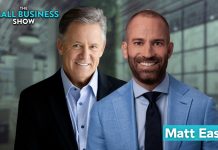Welcome to another episode of Founder Focus with Steve Greenfield, an ASBN original series that focuses on the journeys of some amazing founders. In this segment, Greenfield sits down with Jim Flint, founder of Local Search Group.
Transcription:
Steve Greenfield :
Welcome to this week’s Founder Focus segment, where we dive into the inside stories behind some of the most impressive entrepreneurial journeys. Founder Focus takes us on an intimate conversation with innovators and entrepreneurs and the great companies they’ve built.
Steve Greenfield :
This is Steve Greenfield from Automotive Ventures, and thanks for joining us.
Steve Greenfield :
This week, I’m excited to welcome our guest Jim Flint, who was a successful automotive executive before transitioning to and founding a very successful advertising agency. His company, Local Search Group has won numerous awards and recognition, including being ranked by Inc Magazine as one of the fastest-growing ad agencies in the nation. Jim has a real passion for the industry and has written a book on how to be a successful car dealer.
Steve Greenfield :
So with that, let’s welcome Jim to the show. Welcome, Jim.
Jim Flint:
Thanks for having me.
Steve Greenfield :
Great to have you here.
Steve Greenfield :
Let’s get started. Tell us a little bit about why you started the company. What was the spark that ignited the idea?
Jim Flint:
Well, back in the day with Toyota, I very much had the entrepreneurial mindset even then, but one of the things that I learned there was the principle of kaizen, which is continuous improvement. I was the guy who was like, “Well, wait a second, this internet thing, it’s going to be really big. And if we did this and we did that and we did the other, we can make these things happen.” And it wasn’t necessarily about being right or wrong at that time; it was about making sure that the growth that occurred was controlled growth.
Jim Flint:
I think I was born with this entrepreneurial spirit, but the corporate metal kind of melded me into the person that not only wants to have that outstanding growth, but who wants to understand along the way, what it was that we did in order to get to where it is that we are so that we can continue down a prosperous path. So I’ve had a really unique experience there in both worlds.
Steve Greenfield :
Tell us a little bit about your company.
Jim Flint:
My company’s Local Search Group. We do automotive digital marketing, everything from Facebook and Google to Snapchat and even TikTok these days. So we’re trying to find and help our clients get to where the people are. More often than not they’re on their smartphones and so that’s where we focus our marketing efforts. We also do over the top advertising YouTube, kind of all the elements there that you can find on your phone.
Steve Greenfield :
There’s a debate around whether entrepreneurs are born or made. Were you born an entrepreneur? When did you know that being an entrepreneur was the right path for you?
Jim Flint:
It’s kind of like the question about environment or heredity; it’s a little bit of both, but I will say that my parents had a significant influence on me. My mom was very creative and she said, “You can do anything that you can put your mind to,” and my dad was very stoic and worked for the Air Force for 25 years. So anything I made a commitment to, it was about sticking to the commitment. I had unique elements of, “Hey, you can do anything you can dream up,” which is part of the entrepreneurial spirit, but I think what probably separates me from many, not most, not all, is the idea that once you get into it, that you stick with it and stay to the finish.
Steve Greenfield :
Was there a moment in your life when you recognized that the entrepreneurial path was right for you?
Jim Flint:
Yeah, probably in 2008, 2009 when things were happening all around that were way beyond the sphere of influence that I had. There were macroeconomic factors that were creating a crush on the automotive industry, and I’d already been in the business at that point for, let’s say, 15 years. I knew I wanted to stay there. I knew that there were going to be opportunities up ahead, but it was kind of like, “what do I do at this moment at the bottom?” And at that moment in the bottom, what I was able to identify was the opportunities out in front of us.
Jim Flint:
I was working at the dealership at this point as an e-commerce director and Google was becoming this really big thing, and there was this government program called Cash for Clunkers. So I called my rep on the pay-per-click side and I said, “Hey, I want to put this ad in because Thursday night the legislation passed. I’ve already built this website. It’s incredible. It’s got miles per gallon. It’s got every make. It’s got every model. It helps consumers determine eligibility.” And I was really down this kind of SEO path. But the next morning I woke up and other automotive advertisers were in the space via pay-per-click. It was that Saturday morning, right, the legislation passed Thursday night, Friday morning my vendor couldn’t help me get it done. Saturday morning I’d built my first pay-per-click campaign.
Jim Flint:
I pride our companies. I am very fascinated by speed, and it’s how fast can you get to market. That’s what I did. I built my own campaigns because it didn’t seem right to me that somebody else was able to cut in line for all the hard work I’d done organically. I realized that if I wasn’t able to move at the speed of business for me, or for my partners or for my clients, then I had to redefine that game. So I started studying Google literally 15 minutes every morning to start my day. It’s the first thing I did.
Jim Flint:
That’s when I think I knew I was onto something that I cared about and was passionate about. And if you want to say that’s when the entrepreneurial bug bit me, it was because yeah, there was necessity. There was a need not to just sell new cars, but it was used cars and it was to help consumers with cash for clunkers. When you can help clients and consumers and you have technology in the mix, I get excited. You can hear it in my voice I think.
Steve Greenfield :
What was the hardest decision you had to make as an entrepreneur?
Jim Flint:
The hardest decision was when we were becoming very successful. I knew we were doing the right things. And I had studied in school about how cash flow starts to impact you when you become successful. We were adding a lot of clients, we were growing quickly, and then all of a sudden the cash flow situation started to develop. What I did was I put the financing on my personal credit cards, and then I ran the credit cards up to a really high level and then American Express had a few questions.
Jim Flint:
I finally had to go in and sign a personal guarantee, which when you’re doing the right thing and you know what you’re doing it’s okay, but I will tell you that it’s not for the faint of heart. It was kind of at that moment like, “Are you ready?” Because all the things you do to set up an LLC or a corporation, you basically are saying, “Hey, you believe in this, you know this is going to work,” but if it doesn’t work out for some strange reason, you’re basically given your house over to somebody else, and that’s for real.
Steve Greenfield :
What was the highlight of your entrepreneurial journey?
Jim Flint:
For me, it’s about the clients and employees. I really enjoy working with the people and watching them and seeing them grow. That’s where I get excited. Competing and winning is important to us as a team, as an organization and then to our clients in the highly competitive automotive space. We’ve had clients that have gained a market share six years in a row. That’s something that gets me excited and makes me feel good about the work that we’re doing because we’re benchmarking it and then we’re tracking it. And then we’re doing intelligent things to help them not only sell more cars in volume, because sometimes that can be predicated on the market, but within their competitive sphere, are we helping them get their unfair share, because that wins, whether markets are up or down. So we’ve been able to maintain and sustain those healthy long-term growth experiences because of those growth principles I learned back in Toyota day.
Steve Greenfield :
Who was your most influential mentor?
Jim Flint:
I think I had different people for different situations, but I think the most influential people for me have been down one of two paths. There’s the operational path, which is very important to the success of your organization in terms of proper ratios and proper expectations. All those things certainly matter, but also really down the creativity path because in an agency environment, those two things are the fusion, the ying to the yang, and to be able to fuel both those fires, you may feel like sometimes it’s a little bit of Dr. Jekyll and Mr. Hyde, but you have to channel those two different characteristics to be able to run a successful organization.
Steve Greenfield :
What was the best piece of advice you ever received?
Jim Flint:
Man, that’s a tough one. I kind of stay in those micro-moments of that experience and try to extract meaning from those experiences. I’ve learned a lot from clients. Sometimes you have to listen to what it is they say and sometimes it’s what they don’t say that helps you get to where you’re trying to go faster. I’ve been about learning my whole life; come from a family of educators, understand how valuable that is.
Jim Flint:
One client, one time told me, “Look Jim, you’re smart. We get it. But I don’t want you to learn all my business. I want you to earn for my business.” So once I made that shift, I was like, “Thank you for telling me. I value the feedback you just gave me because now I can help drive that through my organization and we can change our perspective.” They don’t really want to be experimented on or piloted with; they want to take that prototype that gives them the edge to help them win the game that they play literally each and every month.
Steve Greenfield :
For the entrepreneurs or want-to-be entrepreneurs who are listening in today, what advice can you give them?
Jim Flint:
I would say start early. Somebody has to be watching out for kind of the creative compliant quality control, because manufacturers are very important to adhere to their guidelines, and you can cost dealerships a lot of money if you go in with something that’s not compliant. So if you’re not really, really good there, you need somebody who is. And then down the other path, which is critically important, a lot of people think in terms of an income statement, but to be successful long-term, you have to be able to triangulate the cash flows and the balance sheet. So if you’re not good with the finances, you’re going to have issues or you’ll have cash burn or you’ll do things that don’t help you structure a company properly for sustained growth.
Jim Flint:
It isn’t about being great in one month; it’s about doing this for one year or five years or 10 years. I think a lot of people go in looking for the unicorn. I’m not. Instead of being the hare, I want to be fast in the daily, but over the long term, I want to be more like the tortoise, because I think eventually that’s who wins the race.
Steve Greenfield :
What’s the most influential book that you’ve ever read?
Jim Flint:
The most influential book; I would say Good to Great by Jim Collins. In fact, when the COVID-19 experience started, one of the first places I went was to that book to help give our team some guidelines and some thoughts. Going into a global pandemic that really no one had experienced before, I looked at the things that companies had done that had helped them be sustained, great at the things that they were doing.
Jim Flint:
One of them was the Stockdale Paradox. And if you haven’t read the book, you should read it. It’s a great story about Admiral Stockdale who survived a prisoner of war experience and his approach to the daily situation. He wasn’t hoping to be freed every day. He was dealing with the reality that he was in every day. And as a result, he didn’t go to bed every night hoping for a vaccine, if you will, in today’s language and structure; he went to bed every night knowing where he was and waking up every morning with renewed emphasis on where it was that he was.
Jim Flint:
Meanwhile, everyone else was hoping that today was going to be that special day. Today was going to be that miracle. Sometimes it’s knowing the reality of your situation that helps you plow through it. That book has been tremendously helpful over and over. There’s plenty of other lessons in there that any aspiring entrepreneur should read and then commit to practice. Really.
Steve Greenfield :
So since you’re in automotive I’ve got to ask, if you could own any car in the world what would it be?
Jim Flint:
I would own … it’s actually on the cover of my book, Car Dog Millionaire. It’s a 1968 Lamborghini Miura. It’s beautiful lines. It’s a beautiful car. That would be the one that I would own.
Steve Greenfield :
Nice.
Steve Greenfield :
That’s it for this week’s Founder Focus, our dive into the inside stories behind some of the most impressive entrepreneurial journeys. Please feel free to contact me at any time. I’ll look forward to catching up to discuss the industry with you. Thanks for tuning in for this week’s Founder Focus, and we’ll see you next week.
The Atlanta Small Business Network, from startup to success, we are your go-to resource for small business news, information, resources.
 Follow us on Facebook here and stay up to date or catch-up on all our podcasts on demand.
Follow us on Facebook here and stay up to date or catch-up on all our podcasts on demand.
While you’re here, don’t forget to subscribe to our email newsletter for all the latest business news know-how from Atlanta Small Business Network.






